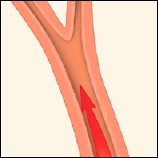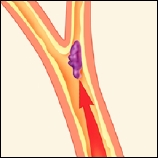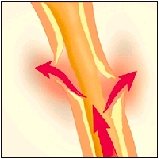Understanding the Link Between High Blood Pressure and Stroke
Understanding the Link Between High Blood Pressure and Stroke
Each day that your blood pressure is too high, your chances of having a stroke are increased. Normal blood pressure is considered to be less than 120 over less than 80 millimeters of mercury (mmHg) or 120/80 mmHg. A stroke is a loss of brain function caused by a lack of blood to the brain. Stroke can result from the damage that ongoing high blood pressure causes in your vessels. If the affected vessel stops supplying blood to the brain, a stroke results.
High blood pressure damages blood vessels
Vessels thickenWhen blood presses against a vessel wall with too much force, muscles in the wall lose their ability to stretch. This causes the wall to thicken, which narrows the vessel passage and reduces blood flow. |
Clots formWhen blood pressure is too high, it can damage blood vessel walls which results in scar tissue. Fat and cholesterol (plaque) collect in the damaged spots. Blood cells stick to the plaque, forming a mass called a clot. A clot can block blood flow in the vessel. |
Vessels breakSometimes blood flows with enough force to weaken a vessel wall. If the vessel is small or damaged, the wall can break. When this happens, blood leaks into nearby tissue and kills cells. Other cells may die because blood cannot reach them. |
Know the symptoms of stroke
During a stroke, blood supply to the brain is cut off. But with prompt medical help, a better recovery is more likely. Don’t wait. Call 911 if you have any of the symptoms below:
Sudden weakness or numbness on one side of the face or body, including a leg or an arm
Sudden trouble seeing with one or both eyes
Sudden double vision
Sudden trouble talking, such as slurred speech
Sudden severe headache
Sudden problems using or understanding words
Sudden dizziness or loss of balance
Seizures for the first time
Any of these symptoms that occur and then resolve
Updated:
September 03, 2017
Sources:
Antihypertensive therapy to prevent recurrent stroke or transient ischemic attack, Up To Date, Venkatesh, A. Management of Blood Pressue for Acute and Recurrent Stroke, Stroke (2009); 40; pp. 2251-2256
Reviewed By:
Fetterman, Anne, RN, BSN,Sudheendra, Deepak, MD


